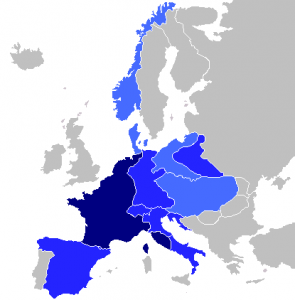For Thursday, please try to get through page 37 of Colonel Chabert. The following brief timeline of Napoleon’s reign may be helpful to you in understanding the story:
1795 – in the wake of the French Revolution, a young Corsican artillery officer named Napoleon Bonaparte shows both extreme ruthlessness and outstanding military skill in putting down a royalist insurrection trying to overthrow the reigning republican government, the Directorate.
1796 – the Directorate puts Napoleon in charge of an army and sends him to Italy (then largely under the control of the Austrian Empire) where he defeats Austrian forces hoping to invade France and restore the Bourbon dynasty to the throne.
1798 – Napoleon invades Egypt, seeking to thereby cut off Britain, which has also declared war on France, from the wealth of its Eastern colonies. Balzac mentions that Colonel Chabert participates in the Egyptian campaign as a mere lieutenant.
1799 – Napoleon is now the most powerful person in France. Upon his return to Paris, the Directorate elects him “First Consul,” giving him de facto dictatorial powers.
1804 – Napoleon uses a plot against his life to declare the return of hereditary monarchy to France, proclaiming himself “Emperor Napoleon I.” He begins a series of wars (the “Coalition Wars”) that will soon bring much of Europe under either direct or indirect French rule, and in which Napoleon’s principal enemies are Austria, Prussia, Russia, and Great Britain.
February 7/8, 1807 – the Battle of Eylau. Napoleon wins a narrow victory against Russian forces near the East Prussian town of Eylau (now called Bagrationovsk and in Russia). Chabert has risen to the rank of colonel, though he also tells Derville that he was promoted to the rank of general immediately before the battle.
1812 – at the height of his power, Napoleon invades Russia. His forces initially make rapid progress, but are then decimated by the harsh Russian winter and by the fact that the retreating Russians systematically burn their own countryside, thereby making it impossible for the French to live off the land.
1813 – Napoleon suffers a catastrophic defeat at the hands of combined Russian, Prussian, Austrian, and Swedish forces at the “Battle of the Nations” near Leipzig. Soon after, coalition troops enter Paris. Napoleon abdicates and is exiled to the island of Elba, off the coast of Italy.
1814-1815 – Congress of Vienna. The victorious coalition forces meet in the Austrian capital to divide up the French empire and decide on the future shape of Europe. The extremely technical nature of these proceedings no doubt helped inspire Balzac’s mistrust of the legal profession. In France, the Bourbon king Louis XVIII is restored to the throne, marking the start of a historical period that would last until 1830 and would become known as “the Restoration.” Colonel Chabert is set during the early days of the Restoration.
February 1815 – start of the “Hundred Days.” Napoleon, assured of the fact that he remains popular in France, flees Elba and rebuilds his army.
June 18, 1815 – Napoleon is defeated for a second time at the Battle of Waterloo, where the victorious forces are led by the British Duke of Wellington and the Prussian general von Blücher. Napoleon is exiled again, this time to the more remote island of Saint Helena in the Atlantic Ocean.
May 5, 1821 – Napoleon dies under mysterious circumstances on Saint Helena, possibly due to poison.
1832 – two years after the Revolution of 1830, which deposed the Bourbon monarchy and put the “citizen king” Louis Philippe on the throne, Honoré de Balzac (1799-1850) publishes Colonel Chabert as part of a series of stories called “Scenes from Private Life,” which are, in turn, one part of a massive story cycle spanning dozens of volumes called The Human Comedy.

